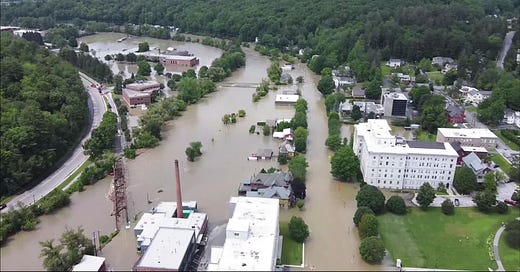Friday Issues: The Global Climate Crisis-Epitome of Our American Crossroads
The floods and heat domes in the Northeast and all across our nation are telling of what world we might live in-and how we can change it
Sending our prayers to the people of New England and all along the Hudson River Valley following these recent weather events.
It is sad to say it, but the climate crisis is already here. Not only that; it came far earlier than anyone had predicted before. The question is how much worse can it get, and what can we do about it.
For years and years, we have been warned about the changing of the climate. The first alarm bells were ringing in the 1970s and 1980s with actions taken by the federal government to mitigate its effects. While not perfect, at least Capitol Hill made a real effort with the Clean Air Act, the Clean Water Act, the establishment of the Environmental Protection Agency, and other notable efforts. Ironically, most of these reforms were occurring under a Republican President-Richard Nixon. Relentless Earth Day movements in the 70s spurred this type of action that unusually placed pressure on lawmakers to actually do something.
Yet it did not last. Not in the Republican Party at least-though they would come to control Congress at the most pivotal movements when climate action was needed. Ronald Reagan in his early presidency infamously claimed that the trees harm the environment and somehow “cause air pollution.” Nothing could be further from the truth right as he was getting the strong backing of the fossil fuel industry and the corporate polluters that have ran the show on environmental and energy policies for a long time. One of the few things that President Bill Clinton got right-with even more credit to Vice President Al Gore then and now as a consistent and devoted leader-was the need to respond to what was a developing crisis in the changing of the environment. But Republicans took control of Congress for 12 years in the 1994 midterms. George W. Bush would be elected President in 2000-ensuring the pursuit of further fossil fuel expansion & environmental degradation in the process that greatly accelerated the pace of our crisis.
Even with some of the progress made in the Obama-Biden Administration and more so after the 2008 election, climate action grinded to a halt as well. It was not only because Republicans swept the House and then took the Senate as well. But any response was worsened by the ongoing efforts by conservative, pro-fossil fuel think tanks, and Republican lawmakers to falsely claim that the climate was not changing. Or if it was, it was just a natural part of the Earth evolving and changing over time. The Republicans not only didn’t support Democratic policies and promoted the interests of the fossil fuel industry. But they also said what was happening in front of us was not really happening. That the climate crisis was not man-made. That it would actually “benefit us.” And that we can “live with it.” More notably, that climate change was just “junk science” and “a Chinese hoax.”
If not for what we have seen in past years, we know now in 2023 that as a country, our government has not done its part to transition our society into a better one with more security, stability, and growth for everyone. Not only didn’t we do our part then, but we haven’t done enough now to keep this planet habitable and teeming of all walks of life-from humans, animals, and plants, to even our natural resources like our water and air that are life essentials for all of us. We are all losing.
We are now seeing the costs of inaction in ways that worsen our budget deficits, harm our communities, stifle economic growth and security, and change the landscape of our military and national security systems as well. We have droughts not just in the West, but all across this country that is a heavy burden on farmers and the suppliers that would offer their natural products to customers and those in need. We see it in the heat waves and domes that last longer and are even more extreme because we didn't cut the greenhouse gas emissions that weakened the ozones and exposed the Earth to more sunlight. Heat systems that kill the elderly and those with pre-existing conditions, exhaust entire state energy grids, and also buckle our nation’s infrastructure and transportation systems. Heat that warms our oceans to a point where they feel like “sauna bath tubs,” and are dangerous for swimmers because of the high levels of bacteria-some of which could be debilitating to our health. We see this too in the unprecedented wildfire smoke that will appear more frequently as well. And also in the tornadoes in the South that are not only becoming more unpredictable and dangerous, but are occurring year-round. If not for all of that, check Vermont with its own historically catastrophic flooding.
Vermont is personal to me. My family before the pandemic took annual trips to Vermont where we stayed at Smugglers’ Notch and then traveled across the rest of the state. It’s been a while and I was a lot younger back then, but we saw the changes taking place there. In the foliage that started earlier than usual-we always went to VT in early-to-mid August. In the rivers that were often running dry over the years. Levels so low you could see entire masses of pebbles and rocks. In Lake Champlain heating up to a point where the bacteria levels were too high to swim in. In the high temperatures that rocked Burlington and Montpelier in ways it hadn’t before in its past history-like the unusual 90 degree weather. And in floods that devastated communities, from financial burdens, to infrastructure damage, loss of life and resources, and the taking of several covered bridges-historic New England landmarks. And yes, that includes the devastating floods this past week.
It’s hard not to see what happened to the places I once visited. Montpelier right around the State House. The railroad bridge on the outskirts of the city. Stowe where the worst flooding in the state took place. Quechee where the rivers became wild streams. Dams overwhelmed. The Winooski River swelling in a way we never saw in person from when we were there. And it very well could continue to flood in that way for weeks. That’s the climate crisis that is here right now.
Our country has to respond to the climate crisis immediately to avoid its most devastating impacts. We can no longer nibble around the edges or look for incremental changes. Time is running out and it is not on our side either. This is a true climate emergency.
It is clear what we have to do. And we can do it. We know the United States can adapt quickly and be a rather resilient country. When the Great Depression came, the country came together to rebuild brick-by-brick together. We jumpstarted the American economy with the programs that were enacted and the community efforts that were made to rebuild neighborhoods & industries for our future success-including as an industrial superpower in the run-up to and during World War II. It took time, but it paid off long term. That is the New Deal legacy. We also know how to unite the country for everyone with the dignity and respect that they deserved. To that end, we passed big civil rights & voting rights protections and pursued a Great Society to end the national cycles of poverty and strengthen the well-being of our most vulnerable Americans. These were all bold moves with vast risks & costs, but it truly strengthened this country in the long term.
We have to do that now in the spirit of those who have pitched the Green New Deal-which, for the record, is a congressional resolution; not a formal piece of legislation. It will not happen with a wish or magic wand, but we have to wean off the fossil fuels over time, and we have to start the work from this point on. We can do this faster if we finally invest in the renewable energy technologies and resources that can bolster those past fossil fuel-producing communities across this country, and the other places that can pitch it all into our bold climate action. That is how we can secure our true energy independence with solar, wind, hydropower, tidal, geothermal, electric batteries, hydrogen fuel cells, cleaner biofuels and biomass products, and other green, blue, and clean energy sources. We can even have nuclear be a transition source from the dirtiest fossil fuels-coal and oil especially. It would be an enormous win for the economy, the environment, our natural resources and treasures, and our communities. Even workers and businesses alike. We can also do so in a responsible way with federal government support, public-private partnerships in research & development, and various energy efficiency programs.
I also believe, both in a pessimistic and optimistic way, that we can innovate and grow in finding methods and techniques to get present carbon dioxide, greenhouse gases, and other pollutants out of our atmosphere and out of our water systems. Doing so may indeed be a real necessity for mitigating the very worst impacts of the climate crisis, improving our quality of life, conserving and protecting our environment with its natural ecosystems and resources, and growing our economy in the process. It would take a lot of federal-and state-investment, along with coordination and political will, but it will also benefit our great country in the long term. As was the case with both the New Deal and the Great Society.
I could make similar cases on other issues, like a national universal single-payer healthcare system that was long supported by FDR, Harry Truman, and LBJ to an extent, and implemented today all across Western Europe; or even just to have a public option (maybe I will write on that someday). But on this issue of national bold climate action and a sturdy & reliable renewable energy portfolio, these are the situations that will test our resolve and show the real potential & opportunity of our nation. Transforming our nation in the very way that coal, oil, and gas did to begin and perpetuate the American Industrial Revolutions that still last in our hearts today. The United States has a remarkable way of doing the impossible.
And that is another part of our Progressive Promise for a More Perfect Union. Right now for my generation-as well as older generations of family and friends-and for the long term. Including our own children & grandchildren after us.
Those are also among the many issues that are at stake in the upcoming 2024 elections that will not only leave a lasting legacy on the meat and potatoes front, but will also define who we are as a country.





